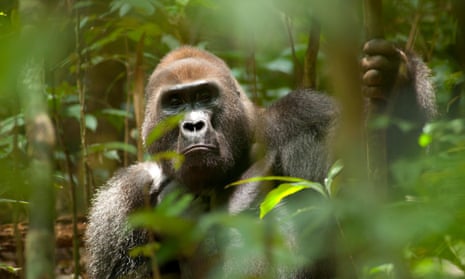Every year, 18 million hectares of tree cover – an area the size of England and Wales – is cut down, releasing millions of tons of carbon emissions into the atmosphere. In just 40 years, possibly 1bn hectares, the equivalent of Europe, has gone.
Trees soak up carbon dioxide so when they are gone the gas lingers in the atmosphere, leading to temperature rises and climate change. Deforestation almost rivals emissions from the world’s 1.2m cars and lorries – 12% of global greenhouse gas emissions each year come from felled trees. Yet, the importance of forest conservation to fighting climate change is underestimated.
There is some hope – at the Paris climate summit in 2015, more than 50 developing countries who share the world’s tropical forests all promised to crack down on illegal forestry, replant trees and restore degraded forest lands.
Indonesia, for example, which has the fastest deforestation rate of any single country in the world and is the sixth largest carbon emitter, promised to cut its emissions by 29% by ending illegal deforestation and restoring 12m hectares of forested land. If all countries stick to their pledges, carbon emissions could be reduced by up to 30% worldwide.
But the conservation of forests is easier said then done – partly as many of the countries affected are some of the poorest. So where will the money to protect forests come from and how do donors ensure it’s spent ethically? Who should lead conservation efforts? And how can indigenous forest communities ensure that they have a say in any negotiations over their home?
Join an expert panel on Thursday 30 March from 2.30-4pm BST, to discuss these questions and more.
Panel
Tim Christophersen, UN-REDD team leader, UN Environment, Nairobi, Kenya @TimChristo
Tim focuses on sustainable forest management and a transition towards a green economy. Previously he worked for the Secretariat of the Convention on Biological Diversity.
Peter Holmgren, director general, Center for International Forestry Research, Bogor, Indonesia @pholmgren @CIFOR
At CIFOR, Peter leads a team of more than 200 scientists and staff operating in over 40 countries.
Frances Seymour, senior fellow, Center for Global Development, Washington DC, USA @FrancesJSeymour @CGDev
Co-author of Why Forests? Why Now? Former director general at the Center for International Forestry Research.
Shyla Raghav, climate change lead, Conservation International, Virginia, USA @ConservationOrg
Shyla focuses on identifying nature-based solutions to climate change. Previously, she’s worked with the Adaptation Fund, the UNFCCC, and the UNDP.
Mary Louise Malig, campaigns coordinator and research associate, Global Forest Coalition, La Paz, Bolivia @MaryLouMalig @gfc123
Researcher, trade analyst, campaigner; Mary’s publications delve into the World Trade Organisation, climate change, and industrial livestock production, a key driver of deforestation.
Tep Boonny, executive director, Save Cambodia’s Wildlife, Phnom Penh, Cambodia @SCWCambodia
Tep leads a natural resources conservation NGO in Cambodia.
Per Pharo, director, The Norwegian Climate and Forest Initiative, Oslo, Norway
Per runs a government funded programme dedicated to reducing tropical deforestation, with an annual budget of 3bn Norwegian kroner (£282m).
Ian Gray, coordinator, Forest Investment Program, Washington DC, USA
A forester with experience in government, private sector and civil society organisations.
Cristiane Mazzetti, Greenpeace Amazon campaigner, Greenpeace Brazil, Manaus, Brazil @crmazzet
Cristiane works with Greenpeace campaigns and other initiatives related to zero deforestation in the Brazilian Amazon.
Rachel Biderman, director for World Resources Institute Brazil, World Resources Institute, Sao Paulo, Brazil @rachel_biderman
At WRI Brazil, Rachel has established programs on climate change, sustainable cities, forests and sustainable finance.
The live chat is not video or audio-enabled but will take place in the comments section (below). Want to recommend someone for the panel or ask a question in advance? Get in touch via globaldevpros@theguardian.com or @GuardianGDP on Twitter. Follow the discussion using the hashtag #globaldevlive.

Comments (…)
Sign in or create your Guardian account to join the discussion